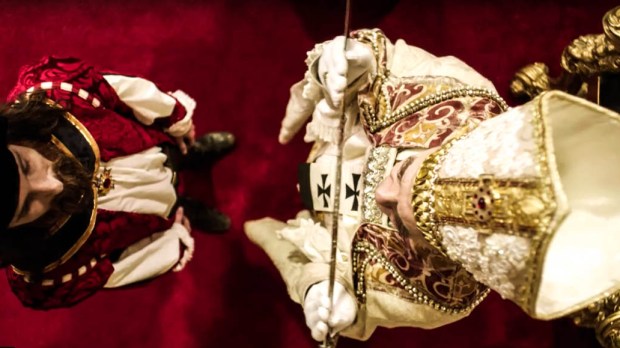Lenten Campaign 2025
This content is free of charge, as are all our articles.
Support us with a donation that is tax-deductible and enable us to continue to reach millions of readers.
Given the media’s hit-or-miss handling of the facts over the past few years, the very notion of any cable news channel airing a documentary series on the papacy is enough to send chills up the spine of any Catholic. Fortunately, the premier episode of CNN’s six-part series, Pope: The Most Powerful Man in History, is nowhere near as bad as it could have been. Of course, it’s nowhere near as good, either.
One unavoidable criticism of the show is that with over 5,200 bishops, 416,000 priests, 44,000 deacons, 54,000 religious brothers, and 10,000 nuns available to talk to, the makers of the series managed to find one, and only one, Church official to interview, Cardinal Donald Wuerl of the Archbishop of Washington. And even then, His Eminence only gets a handful of lines. The remainder of the onscreen opinions belong to the usual collection of progressive scholars and skeptics, most of them non-Catholic, who so often appear in these types of things. Because if you want to explore such an important part of Catholicism as the papacy, why would you actually bother talking to a lot of Catholics, right?
Despite that, the show doesn’t burst forth from the gates oozing anti-Catholicism as one might worry it would. The debut episode begins, appropriately enough, with Peter, whose primacy as the first bishop of Rome goes surprisingly unchallenged. In fact, the Catholicity of the early Church is pretty much taken as a given. In one of the show’s more interesting moments, the documentarians are allowed into the library of the monastery of the Church of the Holy Sepulchre to view, though not touch, the oldest existing copy of the Didache. This document written in the 1st century is basically a catechism and contains teachings and instructions most of today’s Catholics would (or should) find familiar.
After this, however, the show skips a few hundred years and some 16 popes to the time of Constantine, where it discusses the Roman emperor’s conversion to Christianity. It then time-hops through the Lombards’ invasion of Italy, the rise of Charlemagne, and finally settles on the Crusades. Quite expectedly, it’s here the documentary gets somewhat selective in the facts it presents. Some lip service is given to the initial pious intentions of the crusaders, but the narrative quickly zeroes in on the viciousness of their later actions, as well as the heroism of Muslims such as Saladin, the first sultan of Egypt and Syria. Discussing such incidents as the Rhineland massacres, one commentator assures us that the 2,000-year history of the Church is full of such crimes and tragedies.
It’s not that such a statement is necessarily untrue. In a world populated by sinners, it stands to reason that the Church would have its fair share of them. What is missing from the show’s cursory examination of history, however, is a balancing look at all the good that has come from the existence of the Church. It would have been nice to have at least a few moments granted to the Church’s care of the poor, as well as its contributions to literacy, science, medicine, art, culture and philosophy.
Those things are not what the series is ultimately interested in, though. If the focus of the first episode is any indication, the remainder of the series is not going to be so much on the development of the Church or the papacy itself, but on the Church’s overall place in the power structure of the world at key points in history. Coming episodes feature titles such as “The Wartime Popes” and “Courage, Change & the Modern Papacy.” In short, the series will likely focus on exactly what you would expect a cable news channel to concentrate on; politics. That is the god they truly worship, after all.
Pope: The Most Powerful Man in History airs weekly on CNN beginning on Sunday, March 11 at 10:00 PM.

